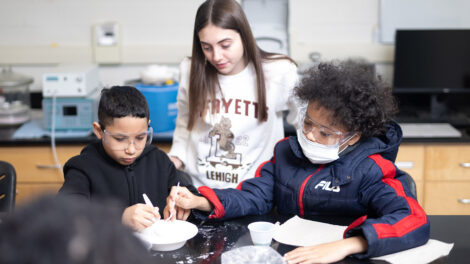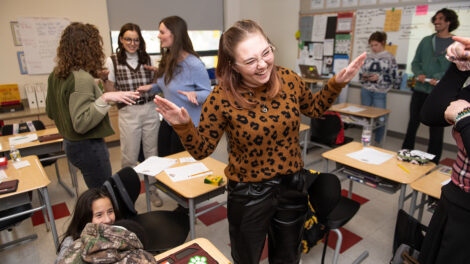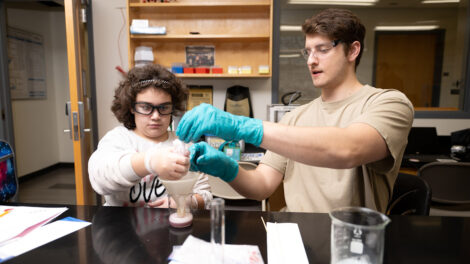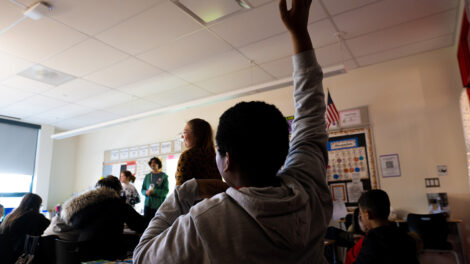Teaching the next generation
By Shannon Sigafoos
Teaching is a demanding job. Not only do teachers have to balance individualized learning strategies for each student and their unique levels of understanding and emotions, but they also must meet educational standards. This is true for all levels of learning, from the earliest days of elementary school right through college.
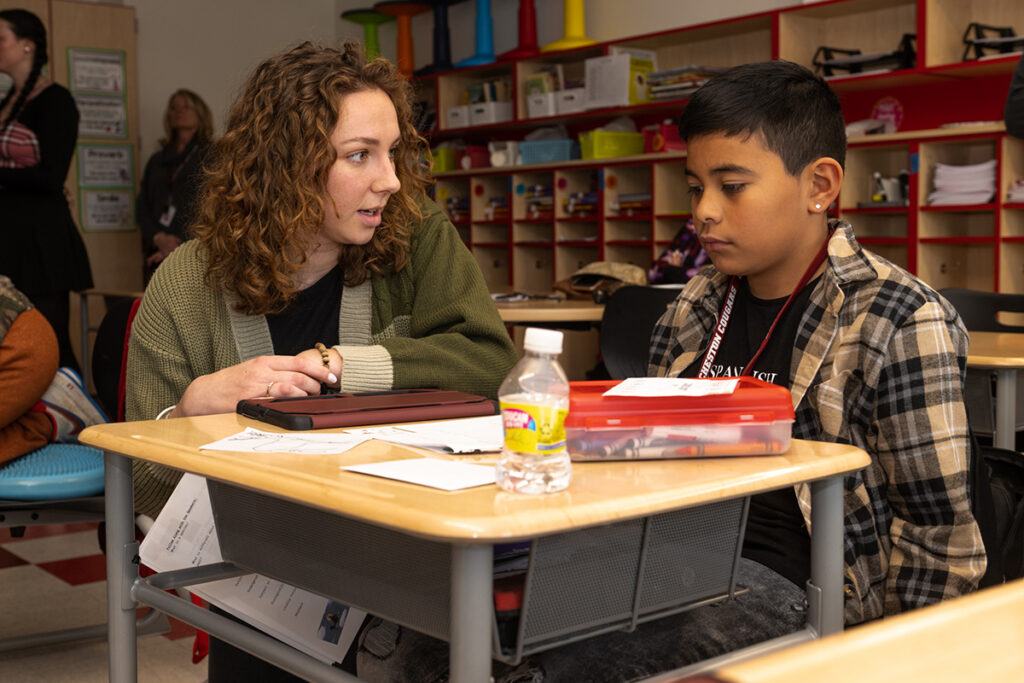 Which is why, year after year, Lafayette students go from being the mentees to the mentors and get to see what life is like from the front of the classroom. As part of the Landis Center’s Connected Classrooms program—which engages more than 600 students and 15 faculty members in collaboration with Easton Area School District—Lafayette students across many disciplines abandon their comfort zones, draft lesson plans, and work with elementary students. This year’s program placed Lafayette students in first through fifth grade classrooms at Paxinosa and Cheston Elementary schools.
Which is why, year after year, Lafayette students go from being the mentees to the mentors and get to see what life is like from the front of the classroom. As part of the Landis Center’s Connected Classrooms program—which engages more than 600 students and 15 faculty members in collaboration with Easton Area School District—Lafayette students across many disciplines abandon their comfort zones, draft lesson plans, and work with elementary students. This year’s program placed Lafayette students in first through fifth grade classrooms at Paxinosa and Cheston Elementary schools.
These modules can be one small part of giving the elementary students a solid foundation for the future. Learning about the world around them and getting hands-on learning opportunities can teach critical thinking, teamwork, creative problem-solving, innovative thinking, and an understanding of scientific methods.
“Being able to communicate science to a general audience that may not have as much knowledge on the topic is a theme emphasized in this class. This is very important, because we have seen with things like the recent pandemic that it is necessary to have scientific communication skills,” shares Caroline McParland ’23, who participated as part of Prof. Meg Rothenberger’s module. “When communicating the information in this way, it forces you to really explain basic concepts and evolve your own understanding. Going off that, the students love to ask questions, which allows the college students to really test their own knowledge of the topic.”
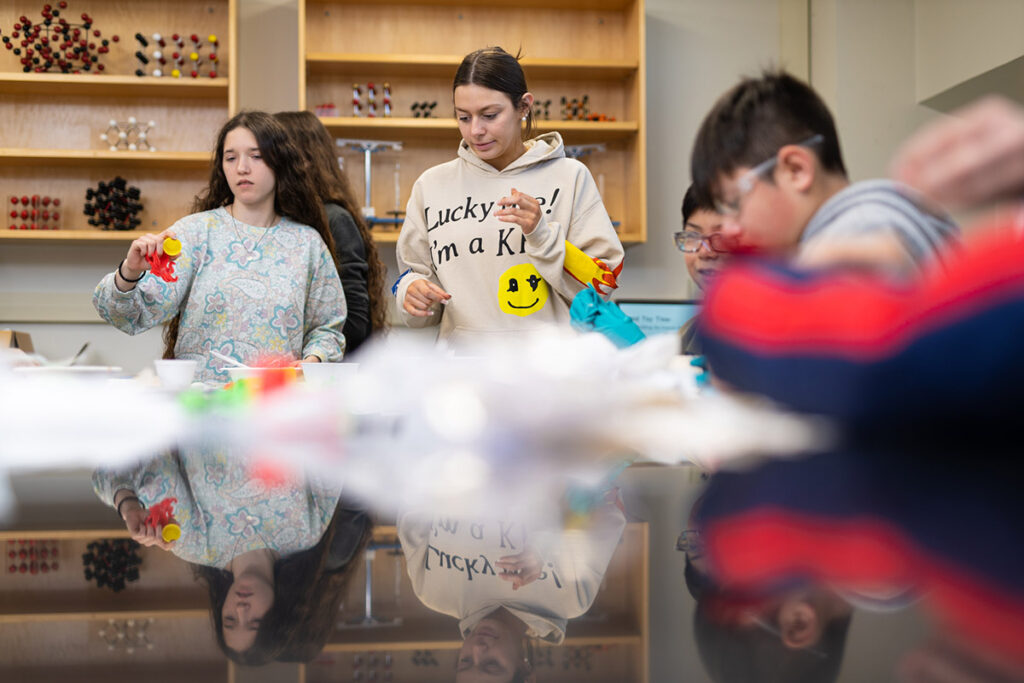 Throughout the fall semester, 11 Lafayette professors assisted their students planning 14 different modules to teach students from Paxinosa and Cheston Elementary schools. For the last several years, Connected Classrooms sessions took place at the elementary schools. This semester, all but two of the modules took place at Lafayette, which gave the younger set a chance to see much of the Lafayette campus and get a feel for where the “big kids” learn.
Throughout the fall semester, 11 Lafayette professors assisted their students planning 14 different modules to teach students from Paxinosa and Cheston Elementary schools. For the last several years, Connected Classrooms sessions took place at the elementary schools. This semester, all but two of the modules took place at Lafayette, which gave the younger set a chance to see much of the Lafayette campus and get a feel for where the “big kids” learn.
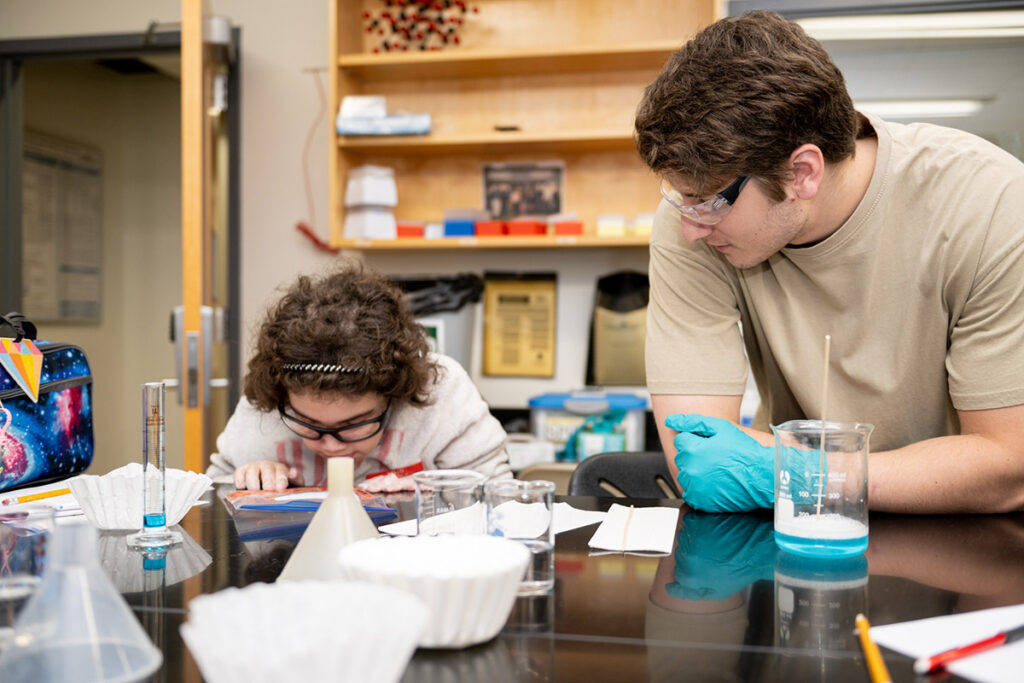 The Connected Classrooms program was developed to engage the children of Easton in a college environment early on in their education, to help them realize that college is a real option for them after they complete high school. For many of these students, it is their first time visiting a college campus. Along with being given a campus tour by Admissions tour guides and student volunteers, they also have lunch with a student-athlete “lunch buddy,” who answers questions and takes time to show them the athletic fields.
The Connected Classrooms program was developed to engage the children of Easton in a college environment early on in their education, to help them realize that college is a real option for them after they complete high school. For many of these students, it is their first time visiting a college campus. Along with being given a campus tour by Admissions tour guides and student volunteers, they also have lunch with a student-athlete “lunch buddy,” who answers questions and takes time to show them the athletic fields.
“The Connected Classrooms program is beneficial to us, as college students, because it helps us take the information we’re learning, process it, and reiterate it in a way that is understandable to those who are outside our field. Having to teach the material yourself gives you a whole new understanding of the concepts you have been taught in the classroom,” shares Brooke Weiss ’24. “It is beneficial to the elementary school students because it is different from their normal lesson plans, which is exciting and may encourage their learning. It is a way for them to connect with their instructors more personally, and to be able to learn a little bit about what life in the future can look like. Several students asked us what college was like with such bright eyes and enthusiasm that it honestly made me look at going to class the next morning differently.”
Read about three of the lessons that took place, and learn about Conserving Species and the Butterfly Effect, “elephant toothpaste,” and strawberry DNA, acid rain, and how engineering design principles can build model prosthetic legs.
More information for faculty
- Lafayette faculty interested in participating in the Connected Classrooms program should complete this interest survey. This opportunity is open to all faculty members for any course.
